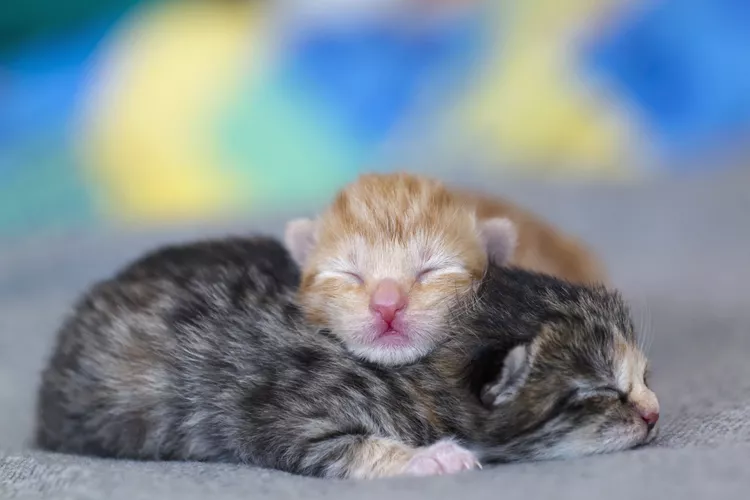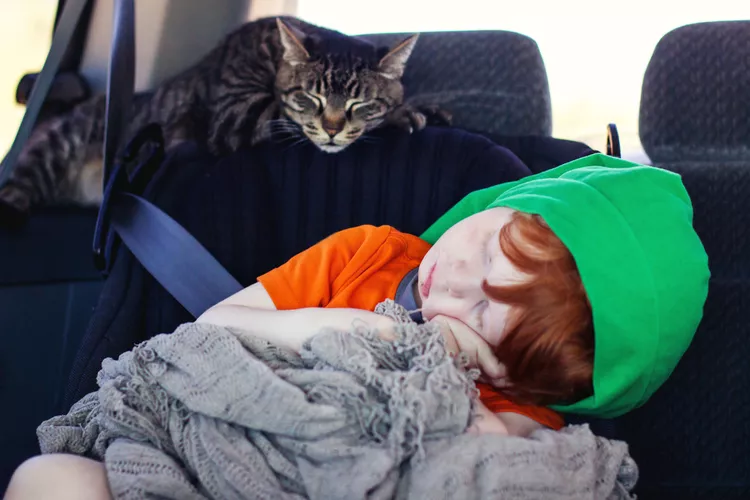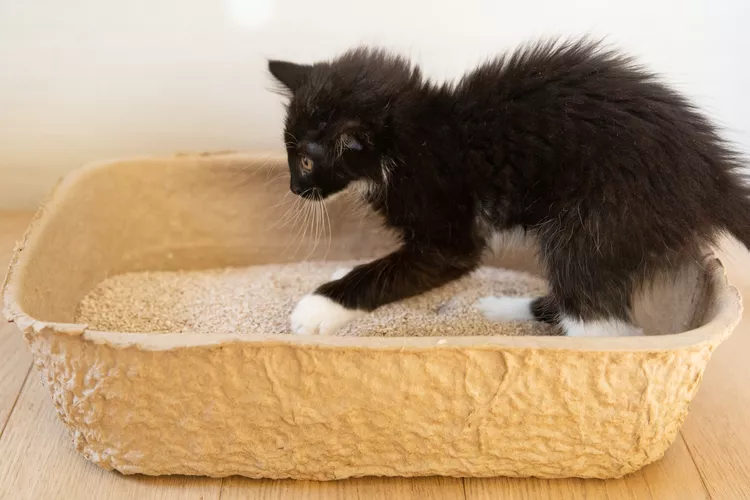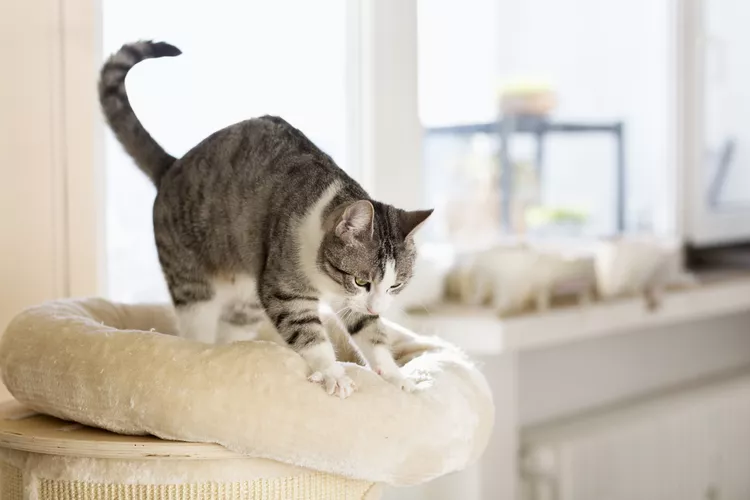
Newborn kittens may be born fully furred but they aren't done growing once they leave their mother's womb. The first week of a kitten's life is full of major changes and growth. If you have a litter of baby kittens, it's a good idea to know what to watch for—as well as know what you can do to help your kitten get off to a good start in life.
When a kitten is born it should fit in the palm of your hand. It will look just like a miniature version of an adult cat with its fur, four legs, two ears, and all its other body parts, but not everything works like an adult cat just yet.
The normal, healthy birth weight of a kitten is about 3.5 ounces which is just a little bit more than a deck of playing cards weighs. By the end of the first week, a kitten typically doubles its body weight putting it at about 7 ounces so these are good weights to record in order to monitor a kitten's growth. If a kitten isn't gaining enough weight it may mean there is something wrong that needs to be addressed.
After two or three days a kitten's umbilical cord will dry up and fall off but its eyes and ears will remain closed for a little while yet. At this point, the kitten is dependent entirely upon its mother (or foster human) for warmth, food, and hygiene. It will crawl around on its belly, cry if it is hungry, sleep, and urinate and defecate when its mother stimulates it by licking it.
You probably won't notice much of a difference between a newborn kitten and a one-week-old kitten but it will start to be more active as the week goes on. Kittens won't be playing with littermates just yet and the only social interaction between each other will be battling for a nipple to nurse from.
Since a newborn kitten is completely dependent upon its mother for the first few weeks of life, you'll need to play the role of mom if your kitten is an orphan or has been neglected by its mother. If the mother is taking care of the kittens then there is little you need to do but some things you should still look for.
Newborn kittens do not have any teeth and get all of their food and nutrition from cat milk. The first few days after giving birth, the mother cat will produce a very special kind of milk for the kittens called colostrum. This milk contains special ingredients called maternal antibodies which help protect the kittens from illnesses until their own immune systems are working. It is very important that kittens start nursing shortly after birth to ensure these antibodies are consumed from the colostrum.
If a kitten is orphaned and needs to be bottle-fed, a special cat milk replacement formula should be used to provide proper nutrition. A homemade kitten formula can be used temporarily. A newborn kitten should consume about seven teaspoons in a day and will eat small amounts every two hours.
At this young of an age there is no effective training that you can do with a kitten. Litter box training will come naturally for a kitten but should not begin until the mother cat is not needed to stimulate it to urinate and defecate.
If the mother cat is present, it is just as important to ensure it stays healthy as it is to monitor the kittens. Kittens need their mother to feed them, clean them, stimulate them, and keep them warm.

212 Hairless Cat Names For Your Beautifully Bald Feline
Discover the perfect name for your hairless cat with our list of over 200 creative and unique names. From quirky to classic, find a fitting choice for your beautifully bald feline companion.
8 Things Your Cat Loves
Just like humans, cats can have a long list of things they like. Find out what cats love so you can keep your cat happy and healthy.
How to Tell If a Kitten is a Boy or a Girl
If you're wondering whether your new kitten is a boy or a girl, here are three ways to help determine the sex of your cat.
8 Tips to Help Cats Enjoy Car Travel
Cats are creatures of habit, and they hate to travel. Learn tips to prepare them for travel in the car, whether going to the vet or on vacation.
Common Causes of Mucus in Dog Poop
Seeing mucus in your dog's poop can be concerning to a dog owner. Here are common causes and treatment of mucus in a dog's stool.
Is Shrimp Bad For Dogs?
Shrimp can be a healthy, nutritional food for people but can dogs eat them, too? What are the main concerns with feeding shrimp to your dog?
Can Dogs Eat Grapes?
Are grapes safe for dogs? Grapes and raisins can cause serious toxicity in dogs. Find out what to do if your dog eats grapes.
Maine Coon Cat: Breed Profile, Characteristics & Care
The Maine Coon cat is of the largest cat breeds in the world. These amiable, gentle cats make great companions. Learn about the Maine Coon cat breed's appearance, temperament, health, and care needs.
Selkirk Rex: Cat Breed Profile, Characteristics & Care
The Selkirk Rex is a charming cat with a tousled coat and a loving, laid-back personality. Learn about the Selkirk Rex breed.
How to Stop Your Cat From Chewing Electrical Cords
Cats are known to pounce and attack inanimate objects, like electrical cords. Learn how to prevent your cat from ambushing objects that may harm it.
What Do Cats Think About?
Have you ever wondered what cats think about? A number of studies have explored cat behavior and feline cognition, but there's still more to learn.
Training Your Kitten to Use the Litter Box
Bringing home a new kitten means they need to learn how to properly use a litter box. Discover how to successfully litter box train your kitten.
Why Do Cats Knead?
Kneading is a common behavior in cats of all ages. Learn why cats "make biscuits" and what it means for you, your cat, and all your blankets.
Dandie Dinmont Terrier: Dog Breed Characteristics & Care
Learn about the Dandie Dinmont Terrier, a silky dog breed with a signature puff of hair atop its head and a friendly, companionable personality.
Tibetan Mastiff: Dog Breed Characteristics & Care
Learn about the Tibetan mastiff, an ancient guardian dog breed. This breed is known for their massive stature, flowing mane, and protective personality.
4 Reasons Why Your Dog Licks Their Butt
Butt-licking in dogs can be a part of normal grooming, but excessive butt-licking is not normal. Read about the most common reasons for this behavior.
How to Teach Your Dog the "Leave It" Command
Training your dog the "leave it" command is a great way to instill self-control. Learn how to teach your dog to not pick things up from the ground.
How to Solve Your Dog's Fear of Car Rides
Is your dog scared of car rides? This fear of riding in cars is common. Learn why your dog is scared of car rides and how to help conquer this fear.
Can Dogs Get Depression? How to Help Your Sad Dog
Can dogs get depression? Learn about the signs of depression in dogs and find out how to help your sad dog.
How to Play Tug of War With Your Dog
Many dogs love to play tug of war, and it's a healthy game that provides great exercise. Learn the best way to safely play tug of war with your dog.